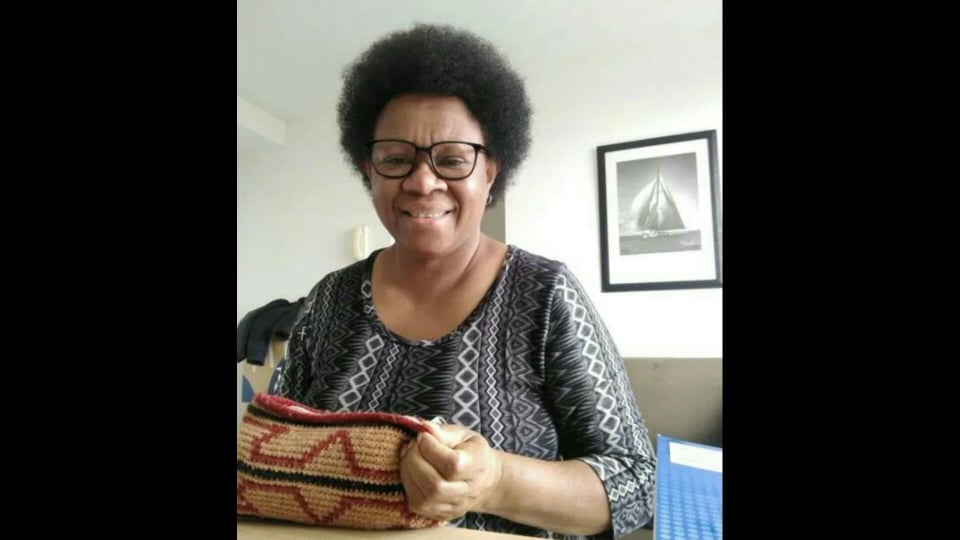Swinburne student helps financially empower Pacific Islander women

Master of Entrepreneurship and Innovation student, Gilda Ann Lasibori, is helping to financially empower Pacific Islander women through selling handicrafts.
In summary
- Gilda Ann Lasibori is studying a Master of Entrepreneurship and Innovation at Swinburne and is the recipient of an Australia Award Scholarship
- She is the founder of Doga Artisans, which helps women in Papua New Guinea earn an income by selling handwoven string bags or bilums
- Gilda is passionate about ending gender-based violence and raising awareness of rising sea levels – issues that are affecting Pacific Islander women
Swinburne Master of Entrepreneurship and Innovation student, Gilda Ann Lasibori is using her knowledge to help financially empower women in her home country of Papua New Guinea.
Gilda’s goal is to help local women overcome some of the issues facing their communities – including gender-based violence, rising sea levels, lack of law enforcement and access to education. she does this by working with them to sell their handicrafts and make an income.
‘On many of our islands, our coastal villages, gardening land and fishing areas are being taken away by the sea,’ says Gilda. As much of the domestic labour falls on women’s shoulders, she says, their struggle to complete these tasks increasingly places them at risk of being subjected to normalised violence that is not brought to justice.
Gilda started social enterprise Doga Artisans to work with artisans, especially women,
based in rural areas of PNG. They create handicrafts like bilums and are supported to earn an income. In doing so, they support themselves and their children independently, ensuring they have financial security if faced with abuse.
‘If we can collectively find ways to resolve issues and challenges, then we can create a better Pacifica for our future generations,’ she says.
Crafting success
Before coming to Australia, Gilda had a role in PNG that assisted enterprises with expanding their trade to international markets. It was there that she first worked with women micro-entrepreneurs from rural areas who needed support to sell their handwoven string bags called bilums.
‘Many of these women have never completed formal education. Some of them are widows and some are survivors. After hearing the amazing and sometimes sad stories of the women, I told myself that even after the project ended, I would do something to continue helping these women,’ she says.
‘I believe I am doing my bit towards helping women earn their own income through the sales of their bilums. I still need all the support I can garner to increase the number of villages I am able to reach. The more villages I can reach, the more women I can assist as it is not easy to reach these remote villages.’
Opportunity to evolve
Two years after starting Doga Artisans, Gilda decided she needed to upskill to further the business.
This led her to apply for an Australia Award Scholarship, which provides research and study opportunities at participating Australian universities and TAFE institutions for people from developing countries, particularly those in the Indo-Pacific region.
Gilda says the selection process was ‘very competitive and challenging’ and is grateful to have been successful.
‘My Australia Award Scholarship has given me an awesome opportunity to study at Swinburne with students and staff from different backgrounds and cultures. I feel like I now have a global family.’

The handwoven string bags, known as bilums, are helping Pacific Islander women to make an income.
The power of education
Gilda’s research supervisor and lecturer in Swinburne’s Department of Business Technology and Entrepreneurship, Dr Rosemary Fisher, is helping Gilda build a website for Doga Artisans with Swinburne’s IT department.
‘Gilda is really an amazing woman. Spend some time with her and you will be gently introduced into a whole new world and discover she has a very strong social conscience and responsibility to her tribe.’
Going forward, Gilda plans to apply for Swinburne’s Accelerator Program, a 12-week program designed to help startup founders find their product-market fit and scale their ventures. She also hopes to undertake a PhD at Swinburne to give her the resources to work with government and donor/aid agencies.
‘I believe that when we educate and empower women, we not only help them improve their lives but that of their families, their communities and ultimately their countries and society.’
-
Media Enquiries
Related articles
-

- Business
- Technology
Swinburne’s Luminate Pitch Night 2024 advances innovative ideas for a better world
Swinburne’s 2024 Luminate Pitch Night showcased market-ready ideas from 10 founders
Wednesday 12 June 2024 -

- Social Affairs
Swinburne is committed to reconciliation “Now More Than Ever”
Swinburne held events across our three campuses to mark National Sorry Day and National Reconciliation Week.
Friday 31 May 2024 -

- Social Affairs
Landmark Swinburne study exposes ongoing discrimination and homophobia
More than half of LGBTIQA+ young people in Australia have witnessed discrimination in community-based sport, according to a new Swinburne University of Technology study.
Friday 17 May 2024 -

- Technology
- Business
Swinburne's Venture Cup unveils pioneering startups as entrepreneurs take centre stage
Swinburne University’s annual Venture Cup pitch night shines a spotlight on remarkable startups by students, staff and alumni.
Thursday 11 January 2024 -

- Business
Is linking time in the office to career success the best way to get us back to work?
In what some employees consider an aggressive move by their bosses to get them back where they can be seen, some companies are now linking office attendance to pay, bonuses and even promotions.
Monday 22 January 2024

